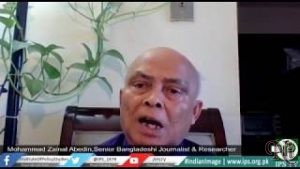-Pakistan’s loss is India’s gain-
N. P. Upadhyaya (Aryal)

Kathmandu: For sure, the Bangladeshi scholar of international standing Zainal Abedin must have felt immense pain learning the refusal statement of Pakistan of the approaching B’deshi aid.
For Pakistan lovers in Dhaka, the refusal statement must have come as a thundering surprise as such “blunt events” in diplomacy and diplomatic conducts” occur rarely.
For Zainal, we presume, the RAW plague that has infested his country (B’desh) needs to be uprooted from Dhaka’s political corridors and from the entire region and that is why he apparently “appealed”, we recall, the international” webinar participants held in Islamabad in the year 2020, June wherein he urged his friends and colleagues to form a broader coalition in order to thwart the RAW hazard from South Asia and beyond.
The scholar proposed coalition has some Islamic countries and left Nepal to the mercy of the RAW.
Nepal is no less hazardous than B’desh as regards the proliferation of the RAW plague.
This should mean that for Zainal Pakistan-Bangladesh means something substantial and meaningful for some special geo-political reasons in the region. The Islamic religion too is one aspect that binds the two nations.
Needless to say, this scholar is unwilling to the Bdeshi’s establishment excessive tilt observed in its political dealings with the Indian regime.
Perhaps Zainal Abedin forgets as to why, sorry to say, Bangladesh was created by splitting Pakistan?

Today’s Bangladesh is what it used to be the East Pakistan-an integral and inalienable part of sovereign Pakistan.
Zainal Abedin knows who is running and controlling the Dhaka establishment’s politics as he is the most vocal scholar in Dhaka who claims that the deep penetration of the Indian RAW spy agency is what has highly corrupted the B’deshi regime and has thus pushed Dhaka closer to Delhi to act like a proxy of the Indian regime.
The logical inference could be Zainal’s hint that Dhaka must equally be closer to Beijing as it would balance the extreme Indian tilt.
To Zainal Abedin’s surprise, Indian retired Military man Ashok Mehta (an Indian buffoon who claims himself as an expert on South Asia and has some highly paid and posted agents in Nepal) says that India has called the relationship a “role model” and Bangladesh the launch pad for its Act East policy as well as a front line state of its Neighborhood First policy.
He made these observations in an an article in ‘The Tribune, India’ dated September 29, 2022.

India neighborhood first policy is already a flop case which need no extra elaboration.
For India, Nepal’s “comfortable” government too is a “role” model as the presumed India elevated Prime Minister Deuba and his coalition “band” is likely to turn Nepal into yet another Sikkim if he remains in power for some four years or so.
High placed political thinkers conclude so.
The highly talkative Indian General Ashoka Mehta is excessively close to the RAW machination and has recruited several “agents” in Nepal who pass secret information’s to him and to his enterprise in Delhi.
However, this remains yet to be substantiated.
This Military man speaks Nepali language fluently and thus seduces the India bend personalities more so the media men who presumably were already in the RAW payroll.
Despite of General Mehta’s claims, Delhi-Dhaka ties are strained due to a host of grievances Dhaka had like Delhi depriving it of “our share of water from Padma and Teesta rivers”, writes the Tribune dated September 30.
General Mehta sees hypothetical Dragon’s penetration in Dhaka that has marred Dhaka-Delhi ties.
In fact it is the reverse.
However, the India tilted sitting Foreign Minister A. K. Momen describes the bilateral relations as “historic and rock solid” with China as a development partner.
Isn’t it hard and difficult to digest?
Whatever may have been the case, New Delhi shall never allow Dhaka to go out of its Orbit or else why the investment in the early seventies for the creation of Bangladesh?
Indeed, China is trying its best to bring out Dhaka from New Delhi’s grip which is explained by this statement of the Chinese envoy posted in Dhaka.
Beijing desires that Dhaka must come out from the iron grip of the Delhi’s machinations which appears impossible for the time being.
Chinese Ambassador Li Jiming in Dhaka last year asked Bangladesh not to join the Quad which stirred the diplomatic hornet’s nest.
The QUAD is a security enterprise that has Australia, India, United States and Japan as members.
The QUAD is the brain child of the US administration.
Yet Delhi will not allow Dhaka to inch closer to Beijing.
Despite Delhi’s grumblings and hair pulling, China is still Dhaka’s biggest trade partner ($18 billion), biggest investor ($26 billion) and has made project commitments worth $38 billion.
In such a political flux of great “push and pull” existing in South Asian region, Pakistani diplomacy is visible not up to the mark or at best it is nonexistent very similar to Nepal.
We once again reiterate that a stronger and energetic Pakistan is in the larger interest of the entire South Asian region more so a nuclear Pakistan is the real deterrent for increasing ambitions of the Indian establishment.
Pakistan’s South Asia based diplomats needs to be reshuffled at the earliest and new young diplomats should be posted to face the emerging South Asian challenges posed by the Indian diplomacy.
If the Indian foreign Minister can meet more than a dozen dignitaries in New York during the UN General Assembly in just two to three days, the complete absence of Pakistani diplomacy is disheartening indeed.
The Flood disaster has definitely kept Pakistan engaged in the domestic front, yet the external face too must not be ignored.
If unobserved, India will enjoy the diplomatic benefits. Pakistan’s loss is certainly India’s gain. It is the simple logic.
Mind it that the Pakistani loss is definitely the Indian gain.
Bangladesh has Hilsa fish diplomacy, and Pakistan has Mango diplomacy.
Fish and Mango are not compatible with each other, however, in diplomacy, nothing is unable to get along if sincere efforts are made.
The message is loud and clear. That’s all.
